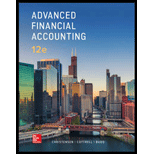
Advanced Financial Accounting
12th Edition
ISBN: 9781259916977
Author: Christensen, Theodore E., COTTRELL, David M., Budd, Cassy
Publisher: Mcgraw-hill Education,
expand_more
expand_more
format_list_bulleted
Concept explainers
Question
Chapter 3, Problem 3.4.3E
To determine
Introduction:
Consolidation: Consolidation is the process of accounting where books of the parent company are reported along with the books of the subsidiary company in consolidated/combined form after making necessary
To choose: Select the best option
Expert Solution & Answer
Want to see the full answer?
Check out a sample textbook solution
Students have asked these similar questions
Do fast answer general accounting question
Which of the following is not a type of financial statement?A. Income StatementB. Balance SheetC. Trial BalanceD. Statement of Cash Flows
Please help me solve this financial accounting problem with the correct financial process.
Chapter 3 Solutions
Advanced Financial Accounting
Ch. 3 - What is the basic idea underlying the preparation...Ch. 3 - How might consolidated statements help an investor...Ch. 3 - Prob. 3.3QCh. 3 - Prob. 3.4QCh. 3 - Prob. 3.5QCh. 3 - Prob. 3.6QCh. 3 - Prob. 3.7QCh. 3 - Prob. 3.8QCh. 3 - Prob. 3.9QCh. 3 - Prob. 3.10Q
Ch. 3 - Prob. 3.11QCh. 3 - Prob. 3.12QCh. 3 - What is meant by indirect control? Give an...Ch. 3 - Prob. 3.14QCh. 3 - Prob. 3.15QCh. 3 - Prob. 3.16QCh. 3 - Prob. 3.17QCh. 3 - Prob. 3.18QCh. 3 - Prob. 3.1CCh. 3 - Prob. 3.2CCh. 3 - Prob. 3.1.1ECh. 3 - Prob. 3.1.2ECh. 3 - Prob. 3.1.3ECh. 3 - Prob. 3.1.4ECh. 3 - Multiple-Choice Question on Variable Interest...Ch. 3 - Multiple-Choice Question on Variable Interest...Ch. 3 - Prob. 3.2.3ECh. 3 - Prob. 3.2.4ECh. 3 - Prob. 3.3.1ECh. 3 - Prob. 3.3.2ECh. 3 - Prob. 3.3.3ECh. 3 - Prob. 3.4.1ECh. 3 - Prob. 3.4.2ECh. 3 - Prob. 3.4.3ECh. 3 - Prob. 3.4.4ECh. 3 - Balance Sheet Consolidation On January 1, 20X3,...Ch. 3 - Prob. 3.6ECh. 3 - Prob. 3.7ECh. 3 - Prob. 3.8ECh. 3 - Prob. 3.9ECh. 3 - Reporting for a Variable Interest Entity Gamble...Ch. 3 - Prob. 3.11ECh. 3 - Prob. 3.12ECh. 3 - Prob. 3.13ECh. 3 - Prob. 3.14ECh. 3 - Prob. 3.15ECh. 3 - Prob. 3.16ECh. 3 - Prob. 3.17ECh. 3 - Prob. 3.18ECh. 3 - Prob. 3.19.1PCh. 3 - Prob. 3.19.2PCh. 3 - Prob. 3.20PCh. 3 - Prob. 3.21PCh. 3 - Prob. 3.22PCh. 3 - Prob. 3.23PCh. 3 - Prob. 3.24PCh. 3 - Prob. 3.25PCh. 3 - Prob. 3.26PCh. 3 - Prob. 3.27PCh. 3 - Prob. 3.28PCh. 3 - Prob. 3.29PCh. 3 - Consolidated Worksheet at End of the First Year of...Ch. 3 - Prob. 3.31P
Knowledge Booster
Learn more about
Need a deep-dive on the concept behind this application? Look no further. Learn more about this topic, accounting and related others by exploring similar questions and additional content below.Similar questions
arrow_back_ios
SEE MORE QUESTIONS
arrow_forward_ios
Recommended textbooks for you
 Financial Reporting, Financial Statement Analysis...FinanceISBN:9781285190907Author:James M. Wahlen, Stephen P. Baginski, Mark BradshawPublisher:Cengage Learning
Financial Reporting, Financial Statement Analysis...FinanceISBN:9781285190907Author:James M. Wahlen, Stephen P. Baginski, Mark BradshawPublisher:Cengage Learning Cornerstones of Financial AccountingAccountingISBN:9781337690881Author:Jay Rich, Jeff JonesPublisher:Cengage Learning
Cornerstones of Financial AccountingAccountingISBN:9781337690881Author:Jay Rich, Jeff JonesPublisher:Cengage Learning


Financial Reporting, Financial Statement Analysis...
Finance
ISBN:9781285190907
Author:James M. Wahlen, Stephen P. Baginski, Mark Bradshaw
Publisher:Cengage Learning

Cornerstones of Financial Accounting
Accounting
ISBN:9781337690881
Author:Jay Rich, Jeff Jones
Publisher:Cengage Learning